In recent years, changing jobs has become common in Japan. Want to quit your job in Japan but not sure how? In this article, we teach you how to resign from your job on good terms and how to write a Japanese resignation letter.
First Published: 2020-09-07
Updated: 2024-07-09
Table of Contents
- Communication is Key to Resigning in Japan on Good Terms
- How to Quit Your Job in Japan Step-by-Step
- When, Where and to Who to Communicate Your Resignation
- Communicating Your Intentions to Resign (with Examples)
- How to Write a Japanese Resignation Letter
- Important Points About Resigning in Japan
- Find a Job in Japan with WeXpats
 Are you having any issues with job-hunting in Japan?
Are you having any issues with job-hunting in Japan?
Communication is Key to Resigning in Japan on Good Terms

To leave your company on good terms, how you communicate your resignation and the reason for it is important. Leaving on good terms means resigning while maintaining a good relationship with your boss and coworkers. With effective communication, not only can you smoothly progress through the resignation procedures, you will also be able to face and move forward with minimal stress.
Misunderstandings and bad impressions may occur if you are unable to properly communicate your reasons for resigning. Not only will it leave a bad aftertaste, if your new job is within the same industry, there is a possibility that bad rumours may spread and affect your reputation. How you resign from your job and the timing of your resignation is important to leaving your job on good terms.
Writer's Pick
How to Quit Your Job in Japan Step-by-Step
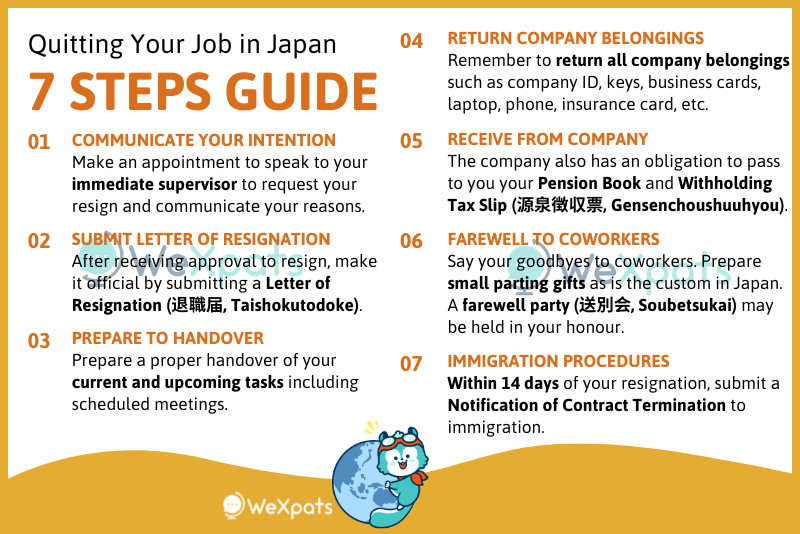
Before we proceed further, let us have a quick look at the process of resignation in Japan.
① Communicate Your Intention to Resign
Take some time to communicate with your immediate superior about your intentions to resign.
② Submit Your Resignation Notice
After reporting to your superior, it is time to make things official with a resignation notice.
③ Prepare to Handover
A proper handover of your current and upcoming projects and tasks, including scheduled meetings and plans is essential for leaving on good terms with your company. It will make things easier for your coworkers or your replacement who have to cover the work left behind. For clients that you regularly contact, do notify them of who they can contact after you leave.
④ Return Company Belongings
On the last day of work, don’t forget to return any company belongings that you have.
- Company ID
- Office Key / Keycard
- Business Cards
- Laptop, Phone, etc.
- Company Car
- Company Insurance Card
- Work Documents
⑤ Receive Necessary Documents
The company also has an obligation to return your belongings and pass you some documents.
- Pension Book
- Withholding Tax Slip (源泉徴収票) - for tax purposes, pass it to your new company
- Resignation Certificate (退職証明書) - for unemployment insurance
- Unemployment Slip (離職票) - for unemployment insurance
⑥ Farewell to Coworkers
There is a custom of giving small gifts to coworkers when you are leaving a company, a “お世話になりました” parting gift of sorts to thank for all the troubles. Say your goodbyes to your coworkers and superiors and give thanks for their guidance and help all this while. Your coworkers may even throw you a farewell party called “送別会 (Soubetsukai)”.
Read more about Japan’s Gift-Giving Culture here.
⑦ Immigration Procedures
Within 14 days of your resignation, you will need to submit a notice to immigration about your resignation. The relevant notice is called Notification of Contract Termination (契約機関との契約が終了した場合の届出). When you have found and started a new job, remember to submit within 14 days of starting your new job, a Notification of Signing of New Contract (新たな契約機関と契約を締結した場合の届出).
In the case of changing jobs (you have a job lined up after your resignation), you can submit a 2-in-1 Notification of Contract Termination and Signing of New Contract (契約終了と新たな契約締結の届出).
Failure to submit the necessary notifications may result in a fine of up to 200,000 yen, and may affect your next visa renewal - shorter period of stay granted.
⑧ Unemployment Procedures (if necessary)
Depending on the circumstances of your resignation, and provided you satisfy the conditions, you may be eligible for job seeker benefits under employment insurance.
For more information, read this English guideline provided by the Ministry of Health, Labour and Welfare or inquire with your nearest Hello Work (official Japanese website).
When, Where and to Whom to Communicate Your Resignation
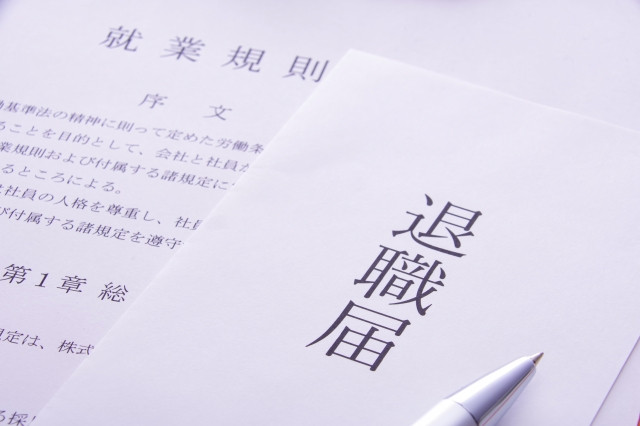
To leave on good terms, be mindful of the timing, the place and to whom to communicate your resignation.
When to Communicate Your Resignation
Check your employment contract or the company’s work regulations for the notice period for notifying your resignation. Although it depends on the company, most places require a 1~2 months notice period. According to civil law, full-time employees are allowed to resign if they give 2 weeks notice in advance. However, 2 weeks may not be sufficient time for a smooth handover. To leave on good terms and not trouble the people you have worked with so far, it is best to inform sooner so preparations can be made.
Finding the right timing to resign is also important to leave on good terms. If you inform people during busy periods such as the end of the fiscal year or the end of the year, it will be a burden on those around you. The best timing is when things are relatively calm and peaceful.
Who to Communicate Your Resignation to
The first person you should communicate your resignation to is your immediate superior. There is a chance your immediate superior will hear it secondhand if you inform your coworkers and subordinates first causing a bad impression. Further, telling anyone above your superior. At the end of the day, your immediate superior will be in charge of handling your resignation and arranging how the work you leave behind will be dealt with, so they are the first person you should inform.
Where to Communicate Your Resignation
You should communicate your resignation in a quiet and private place. Choosing a busy and noisy place will make it difficult to communicate, it may also disrupt work. We recommend that you make an appointment in advance and secure a quiet place such as a conference room.
Communicating Your Intentions to Resign (with Examples)
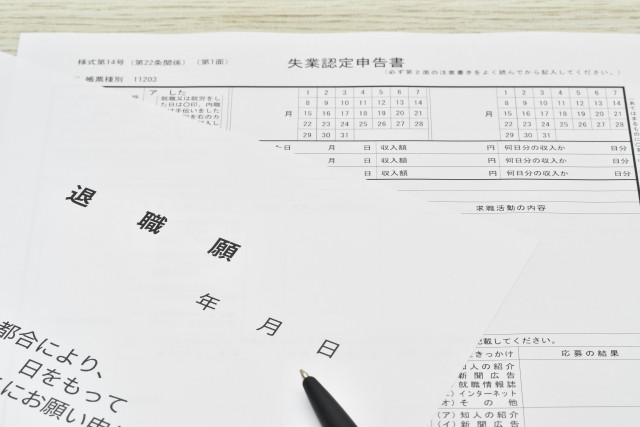
Below are some example sentences on how to explain your reasons for leaving your job. Use them as reference when preparing the best way to convey your resignation and leave with a good impression and an amicable departure.
Resigning for Financial Reasons
「お忙しいところ、お時間をいただきありがとうございます。突然のことで大変申し訳ございませんが、退職することにしました。現在の収入で生活はできているものの、将来を見据えて自分の貯蓄に余裕をもちたいと考えるようになり、これまでの経験を活かして別の業界への転職を決めました。大変身勝手ではありますが、▲月△日をもって、退職させていただけないでしょうか」
(Thank you for taking the time out of your busy schedule. I apologise for the sudden announcement, but I have decided to resign. Although I am able to get by on my current income, I have started to think about my future and would like to have more savings, so I have decided to pursue a career in a different industry. I know this is presumptuous of me, but I would like to resign on [insert date].)
Before you bring up the topic of quitting, it's a good idea to thank your boss for their time. Also, instead of directly talking about your financial problems, you can give them a positive reason for quitting in the future, which will make it easier for them to accept your decision.
Resigning for a Job in a Different Industry
「お忙しいところ、お時間をいただきありがとうございます。突然のことで大変申し訳ございません。実はかねてより〇〇業界に興味があり、将来のことを考えたときに今挑戦しないと後悔するという思いに至り、この度転職を決意しました。大変身勝手ではありますが、▲月△日をもって退職させていただけないでしょうか」
(Thank you for taking the time out of your busy schedule. I apologise for the suddenness. The truth is, I have been interested in the 〇〇 industry for some time now, and when I thought about my future, I came to the realisation that I would regret it if I do not give it a try, and so I have decided to change jobs. It may be selfish of me, butI would like to resign on [insert date].)
Reasons for leaving your job that emphasise your desire to take on new challenges will likely be perceived positively. It is important to convey that you value your past experiences and that you would like to utilise them to succeed in a new place.
Resigning to Return to Your Home Country
「お忙しいところ、お時間いただきありがとうございます。突然のことで申し訳ございません。母国に帰国するため、▲月末で退職させてください。母国で一人暮らしをしている母が体調を崩してしまい、生活をサポートする必要が出てきました。私は一人息子なので、自分以外に介護をできる人がいません。ご迷惑をおかけしますが、よろしくお願いいたします」
(Thank you for taking the time out of your busy schedule. I apologise for the suddenness. I will be resigning at the end of the month to return to my home country. My mother, who is living alone, has taken ill and needs support to carry on with her daily life. As I am her only son, there is no one else who can take care of her. I apologise for the convenience.)
When you apply to resign to return to your home country, be sure to explain the circumstances that force you to go back. The key is to emphasise that there is no other option.
Resigning due to Health Reasons
「お忙しいところ、お時間をいただきありがとうございます。かねてより私の体調不良によりご迷惑をおかけしております。この度病状が悪化し、医師から仕事の継続が困難との診断を受けました。そのため、△月末をもちまして退職させてください。医師から出た診断書を提出しますので、ご確認をお願いいたします。突然のご報告となり、申し訳ございません」
(Thank you for taking the time out of your busy schedule. I apologise for the inconvenience caused by my poor health. My condition has recently worsened, and my doctor has diagnosed that it will be difficult for me to continue working. Therefore, I would like to resign at the end of the month. I will submit the medical certificate from the doctor, so please check it. I apologise for this sudden announcement.)
Rather than waiting up till resignation to let your health condition be known, it may be a good idea to provide regular updates of your condition. Submitting the medical certificate when you inform of your resignation will make things run smoothly.
Resigning due to Personal Reasons
「お忙しいところ、お時間をいただきありがとうございます。この度は異なる環境で自分の力を試したいと考え、退職することにしました。社会人として多くの経験を積ませていただき、感謝しております。大変身勝手ではありますが、▲月△日をもって退職させていただけないでしょうか」
(Thank you for taking the time out of your busy schedule. I would like to try my hand at something different and have decided to resign. I am grateful to have been given the opportunity to gain so much experience. Although this is selfish of me, I would like to resign on [insert date. )
You may not want to divulge the real reason you are resigning, perhaps you are afraid it may not be taken well and lead to leaving on bad terms. There are no rules that you must tell why you are leaving, so you can inform them that it is for personal reasons. Make sure to show gratitude and thanks for the opportunities you were given at the company.
After you have informed your intention to resign, it is time to begin the official procedures for resigning, starting with your notice of resignation.
How to Write a Japanese Resignation Letter
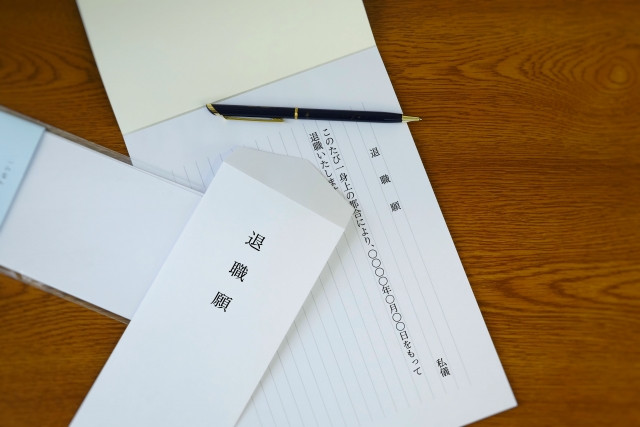
A Notice/Letter of Resignation (退職届) is submitted after you have informed of your intention to resign and it is approved. Other resignation documents include Request for Resignation (退職願) and Letter of Resignation (辞表) which have their own functions. Which to submit depends on the situation and timing.
Difference between 退職願、退職届 and 辞表
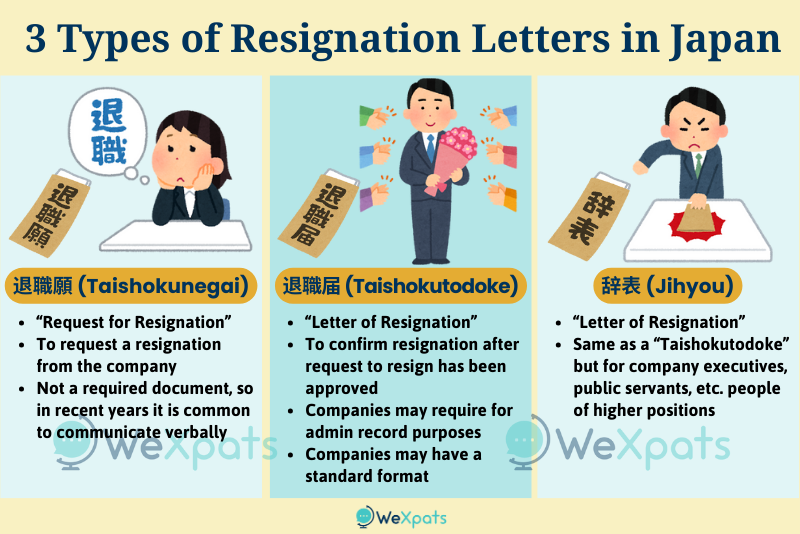
- 退職願 (Taishokunegai) / Request for Resignation: It is a document used to request a resignation from the company. It is not a required document, so in recent years it is common to communicate intentions to quit verbally (refer above). If you want to show your firm resolve to resign in writing, you can submit a Request for Resignation.
- 退職届 (Taishokutodoke) / Notice of Resignation or Letter of Resignation: It is a document used to express your intention to resign after your request to resign has been approved. Depending on the company, it may be done verbally. In order to avoid discrepancies and misunderstandings, companies may require this document as a record for administrative purposes. Some companies may have a standard form for you to fill out.
- 辞表 (Jihyou) / Letter of Resignation: It is a document submitted by company executives, public servants, etc. people of higher positions when they resign from their position. Therefore, if you are employed by a company as a regular employee, it is not something you have to concern yourself with. For those who hold executive or public servant positions, a Jihyou is treated the same as a Taishokutodoke.
How to Write a Japanese Resignation Letter
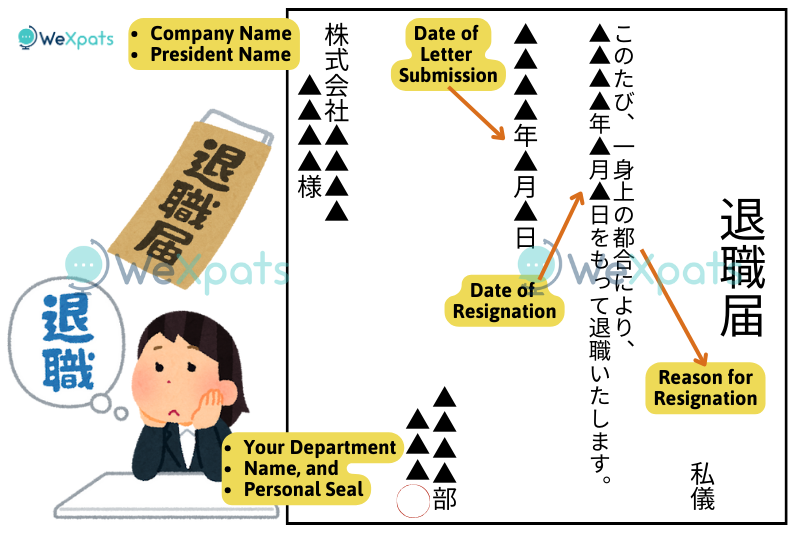
A Japanese Resignation Letter (退職届, Taishokutodoke) has strict rules as to how it is written. It can be handwritten or typed out. Japanese resignation letters are generally written vertically, but it is also acceptable to write it horizontally. If your company has a specified format, follow it.
Resigning due to Personal Reasons
Personal reasons for resigning include:
- Marriage, childcare, family care
- Health condition
- Change jobs or start a business
- Not satisfied with current workplace
- Disciplinary action taken
If your reasons for resigning are one of the above, write “一身上の都合 (isshinjyou no tsugou)”, aka “personal reasons” as the reason for resigning.
【Example Japanese Resignation Letter for Personal Reasons】
- 【1st Line: Title】退職届
- 【Bottom of 2nd Line】私儀
- 【3rd Line: Main Content】このたび、一身上の都合により、▲▲▲▲年▲月▲日をもって退職いたします。
- 【4th Line: Date of Submission】▲▲▲▲年▲月▲日
- 【Bottom of 5th and 6th Line: Your Info】
- [Department Name]
- [Your Full Name]
- 【6th and 7th Line: Company Info】
- 株式会社▲▲
- [President Name]様
Resigning due to Company-related Reasons
If the reason for resigning is company-related, write the reason for resigning that was agreed upon with the company. If you quit due to company-related reasons, you may be able to receive unemployment insurance earlier and for a longer period of time. However, if the reason you quit is company-related but you write “personal reasons” on your resignation letter, it will be treated as “personal reasons”, so be careful.
Company reasons for resigning include:
- Restructuring
- Company Bankruptcy
- Resignation through voluntary resignation system
- Unpaid or late payment of wages
- Termination of temporary employment
- Violation of the law by the company
In addition, if you quit your job for reasons such as bullying, power harassment, or sexual harassment, it is possible to treat it as company-related reasons for resignation provided the company acknowledges it.
【Example Japanese Resignation Letter due to Company-related Reasons】
- 【1st Line: Title】退職届
- 【Bottom of 2nd Line】私儀
- 【3rd Line: Main Content】このたび、▲▲営業所閉鎖に伴う退職勧奨のため、▲▲▲▲年▲月▲日をもって退職いたします。
- 【4th Line: Date of Submission】▲▲▲▲年▲月▲日
- 【Bottom of 5th and 6th Line: Your Info】
- [Department Name]
- [Your Full Name]
- 【6th and 7th Line: Company Info】
- 株式会社▲▲
- [President Name]様
If your company refuses the resignation letter unless you write it for personal reasons even though it is for company-related reasons, you can consult with Hello Work and file an objection. Remember, the reason stipulated on the resignation letter is important for claiming unemployment benefits. It will affect how soon you can claim benefits, the period benefits are provided, and even the amount of benefits receivable.
Important Points About Resigning in Japan
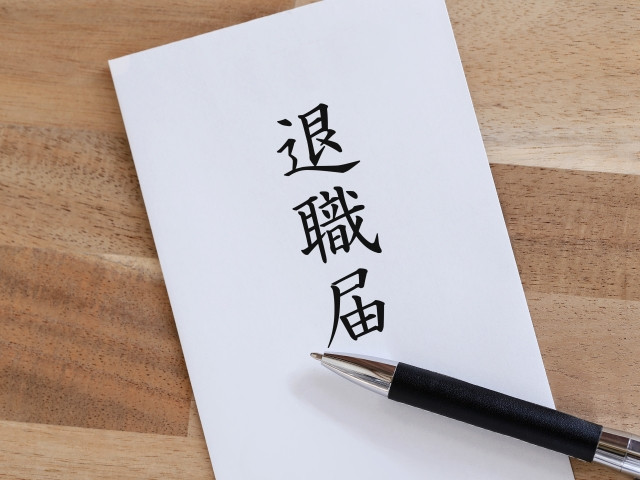
There are a few important things to know about resigning in Japan, such as what to do about your remaining paid leave, how long you can stay in Japan after resigning from your job, and other practical things to know.
What shall I do about my remaining paid leave?
In some countries, you can choose between using up your remaining paid leave to offset the remaining days of work you have left, or be paid salary for your remaining paid leave. In Japan, the latter is not customary. Make sure to check your remaining number of days of paid leave before submitting your notice of resignation, and adjust it accordingly to avoid interfering with your handover and work too much.
For example, if you have 10 days of unused paid leave, you can take 2 weeks off to offset your notice period. However, if your notice period is one month before resignation, that only leaves 2 weeks for you to handover and settle all your affairs. Consider if this is enough time to properly handover and will it cause too much trouble for others around you.
What are unemployment benefits?
Depending on the circumstances of your resignation, and provided you satisfy the conditions, you may be eligible for job seeker benefits under employment insurance. Unemployment benefits from employment insurance include job seeker support to help those who have become unemployed have a stable life and enable them to find new employment as soon as possible.
To inquire about or apply for unemployment benefits, contact Hello Work (official Japanese website). For more information about unemployment benefits, read this English guideline provided by the Ministry of Health, Labour and Welfare.
How long can I stay in Japan after quitting my job?
Your status of residence, or work visa, is subject to revocation if you are not engaged in work for 90 days (3 months) or more, unless there is a valid reason. A valid reason may include in the midst of finding a job through Hello Work. If you are unable to find a job by the end of your visa’s period of stay, your visa cannot be renewed.
※ ISA, “在留資格の取消し(入管法第22条の4)”
Find a Job in Japan with WeXpats

WeXpats operates a service for foreign nationals who want to work in Japan. There are jobs in a variety of industries. There are 2 services available on WeXpats - WeXpats Agent for full time jobs and WeXpats Jobs for part time jobs.
Looking for a Full Time Position? Leave it to WeXpats Agent!
WeXpats Agent is a career support service that specialises in employment for foreign nationals living in Japan.
Recruitment agencies in Japan are a service where dedicated career advisors will assist you with your job hunt for free. In addition to introducing open positions, we also provide support to help you create your Japanese resume and practice for interviews. Worried about job hunting in Japanese? We are here for you.
Features of WeXpats Agent
-
We have many job openings that are a good fit for foreign nationals to work in, such as translation, interpretation, inbound, etc. jobs that make use of your language skills, as well as engineering etc. jobs that do not require Japanese skills.
-
Our career advisors support and help you prepare your resume and practice job interviews with you. Clearly communicate your strengths to the hiring company.
-
We will handle communication with companies on your behalf, such as arranging interview dates and negotiating conditions. And thereby reducing your stress and time spent.
Finding a Part Time Job? Browse on WeXpats Jobs!

WeXpats Jobs is a part time job site for foreign nationals living in Japan. You can search for jobs in 11 languages (English, Vietnamese, Korean, Indonesian, Traditional Chinese, Simplified Chinese, Burmese, Thai, Spanish, Portuguese), including Japanese. Find jobs that suit you by specifying your Japanese language level, occupation, location, and etc.
※ You can register from outside Japan, but only those living in Japan can apply for jobs.



































